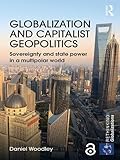Globalization and capitalist geopolitics : sovereignty and state power in a multipolar world / Daniel Woodley.
Material type: TextSeries: Rethinking globalizations ; 60.Publisher: Abingdon, Oxon ; New York, NY : Routledge, is an imprint of the Taylor and Francis Group, an Informa business, [2015]Copyright date: ©2015Description: 1 online resourceContent type:
TextSeries: Rethinking globalizations ; 60.Publisher: Abingdon, Oxon ; New York, NY : Routledge, is an imprint of the Taylor and Francis Group, an Informa business, [2015]Copyright date: ©2015Description: 1 online resourceContent type: - text
- computer
- online resource
- 9781317755722
- 1317755723
- 327.1 23
Includes bibliographical references and index.
Print version record.
Cover; Half Title; Title Page; Copyright Page; Table of Contents; List of tables; Dedication; Preface; Acknowledgements; 1. Globalization and world order; Introduction; The political economy of world order; After hegemony; Conclusion; 2. Capitalist sovereignty; Introduction; Capital as subject; The tyranny of abstraction; Conclusion; 3. Corporate globalization; Introduction; The logic of corporate power; Dominant capital and corporate agency; Transnational neoliberalism; Conclusion; 4. The state form of transnational capital; Introduction; Towards a world state?
Networks of transnational powerThe regulatory form of the global commodity production system; Conclusion; 5. The crisis of Western economic power; Introduction; The logic of Western military and financial power; Accumulation crisis; From financial instability to monetary collapse; Conclusion; 6. Towards a posthegemonic global growth system; Introduction; The economic geography of competitive regionalism; The challenge of emerging market economies; New growth poles in the global economy; Conclusion; 7. Capitalist geopolitics; Introduction; The geopolitical dilemma of the West
Counterhegemonic regionalismGerman Europe; Conclusion; Abbreviations; Bibliography; Index
Globalization and Capitalist Geopolitics is concerned with the nature of corporate power against the backdrop of the decline of the West and the struggle by non-western states to challenge and overcome domination of the rest of the world by the West. This book argues that although the US continues to preside over a quasi-imperial system of power based on global military preponderance and financial statecraft, and remains reluctant to recognize the realities global economic convergence, the age of imperial state hegemony is giving way to a new international order characterized by capitalist sov.

There are no comments on this title.